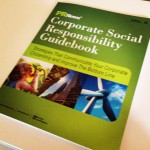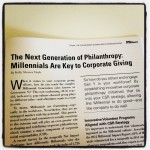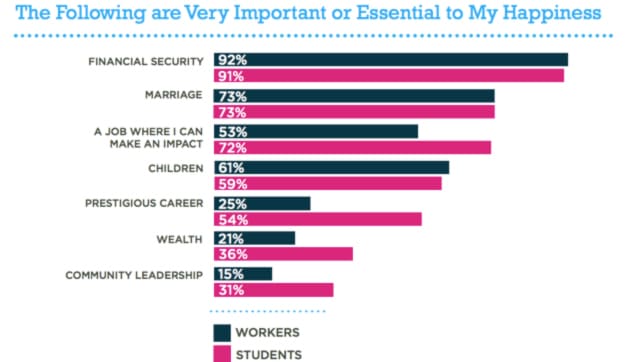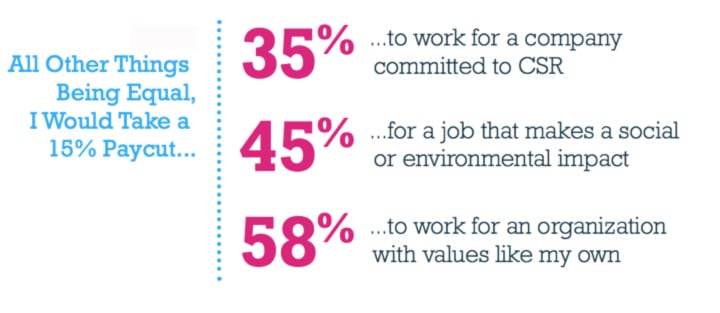

In a survey by the nonprofit Net Impact, polled 1,726 individuals (currently en-rolled university students about to enter the workforce, and currently-employed college graduates) found that 53% of workers said that “a job where I can make an impact” was important to their happiness, and 72% of students about to enter the workforce agreed. More importantly (and shocking) is that with all other things being equal, 58% of Millennials would take at 15% pay cut to achieve this goal.
Thus, when creating a strategic philanthropic plan that aligns a company’s corporate giving with its business objectives, it’s important to have a portion of the plan focus on employee engagement. Without that piece, there is no buy-in and the plan will fail.
So how do you attract and engage Gen Y in your workforce? By establishing innovative corporate philanthropy initiatives that tie into your CSR strategy and allows the Millennial to do good and the company to do well.
Innovative Volunteer Programs Aligned With CSR Strategy
It’s important to understand that volunteering is engrained in the Millennial culture. A study by 2012 Millennial Impact Report indicates that 63% of Millennials volunteered for a nonprofit in 2011 and 90% of survey respondents said they expect to volunteer as much or more in 2012 than in 2011.
To attract workers, companies have started offering Volunteer Paid Time off (VPTO) – yes, that actually exists. This program allows employees time off to volunteer during work hours and is a great way to attract Millennials to come work for your company. Companies can set a designated number of hours (such as 4, 8, or 16 hours per year) for employees to give back to their communities. Last year, Ford launched this program and gave all employees 16 hours of paid time off to volunteer. In South Florida, JM Family Enterprises approved eight hours of paid time off per year as part of their employee volunteer initiatives.
Companies can maximize their CSR efforts by allowing VPTO to employees only if the charities associated with the volunteer program align with the company’s CSR strategy. For example, a construction company may decide recycling products is an important CSR initiative. They form a partnership with a charity that builds homes and donate all of their left over products. This company would then give VPTO to employees who volunteer for this specific charity. Thus having a holistic CSR approach.
Since a key focus of CSR is Planet, People and Profits, another opportunity to engage Gen Y-ers is to establish a “Dollars for Doers” program and focus on the company’s internal people. Dollars for Doers is a ramped up version of matching gifts. Instead of a company solely matching an employee donation, companies now designate a contribution amount ($100, $500, $1,000) to the employee’s charity of choice for volunteering a certain number of hours. In essence, they get “dollars for doing.” It shows that the company supports volunteer efforts, but more importantly empowers the Millennial to have a say in the charity he/she wants to support.
Some global companies, like IBM, have become very forward thinking when it comes to volunteer programs and CSR efforts. They send employees on one-month volunteer assignments to developing countries so that these underserved communities can have their problems solved, IBMers receive leadership training and development, and IBM identifies emerging markets and global leaders. Providing this unique opportunity and benefit attracts star quality students entering the workforce, improves the skills of their current employees and more importantly, is a less expensive source of market research.
Recruiting the Millennial workforce by offering attractive employee engagement programs is imperative to staying relevant and competitive. However, it’s not just the Millennial workforce that needs to be engaged, it is also the Millennial consumer. CSR and Corporate Philanthropy is and will continue to be a major component of how companies engage their consumers.
Engaging Millennials As Consumers Through CSR & Corporate Philanthropy
Millennials have grown up believing that they have a greater role to play as global citizens and taking care of our planet. They grew up recycling and using less water and demanding that companies take more responsibility for the environment. Gen Y understands the importance of the bottom line, but believes that companies should do their part in society and give back to the communities they serve. According to Edelman’s Good Purpose study, a stunning 76% of global consumers believe it is okay for brands to support good causes and make money at the same time, up from 57% in 2008.
A recent Cone Communication study also shows that 90% of consumers want companies to tell them the ways they are supporting causes. That’s a total of 278 million people in the United States. Eighty-five percent of consumers also have a more positive image of a company or product when it supports a cause and 83% of Americans wish more of the products, retailers and services they use would support a cause. More importantly, consumers are demanding all types of companies give. Corporate Philanthropy and CSR will become increasingly important as the consumer market begins to shift. Currently numbered at 79 million – and growing in influence – Millennials are expected to outnumber the Baby Boomer population 78 million to 56 million by 2030.
Furthermore, it is no secret that Millennials are the most wired generation. In addition to be being socially conscious, they have grown up in a digital world; they have adapted easily to all the technology changes. Gen Y’s life has been so intertwined with technology they often have little patience with those who are not as familiar with it. Thus, it’s important to speak their language and connect with them when implementing corporate philanthropy or CSR initiatives. The way the Millennial generation has engaged with brands, channels and other models online has been instrumental in creating the current “participation economy.”
Companies like AT&T and Patagonia know that CSR reports and information about a company’s giving needs to be interactive to engage this generation and serve as great examples for companies to model. In 2011 Toyota launched “100 Cars For Good” – a Facebook-enabled philanthropy initiative that engages the public to determine how corporate philanthropic donations will be awarded. The program was so successful in consumer engagement, that they brought back the program in 2012.
While non-Millennials have a stereotypical view of this generation as lazy and entitled, it has possible affected how company executives have marketed to them. However, “some may argue that the peak spending years of the Millennials are far enough in the future that companies can take their time in developing well-targeted, appealing products and services,” says Chris Egan, COO of the customer experience analytics agency SMG. But we believe that staying on top of Millennial trends is critical because they will ultimately influence today’s big spenders, the 35-to-74-year-old non-Millennials.”
Companies who are willing and able to adapt to this generation will reap the benefits of this socially conscious worker and consumer. Much like the Baby Boomer generation helped shape and grow the American economy, the Millennials will push companies to become better versions of themselves.








